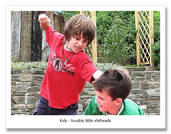 What’s the overall character of your home? Is it a waystation for weary travelers, where family gathers after a hard day’s work, play, or school? Do each of you have your room and your things, leave me alone? Do you have personal force fields, television, ipad, gaming controls, that others have to penetrate before getting to interact with you? If any of these questions represent the character of your home, guess what? Kindness doesn’t live there. Kindness is a quality of social interaction that can be an intentional part of any relationship. It’s doing for someone else without being directed or asked. It’s being with someone because you cherish that time together. For parents, it fills your interaction with your child with teachable moments of direction, instruction, encouragement, and cheer-leading. It eases drama, makes conflict more manageable, and takes all into account where family planning activities are concerned. How about inviting kindness into your home and your family? Twelve-year-old Travis got home from school early. After retrieving a plate of fresh-baked chocolate chip cookies from the kitchen, he plopped in front of the television and got lost in the music video he found. He glanced out the window to see his ten-year-old sister, Heather, getting off the school bus and coming into the house. Instinctively, Travis pulled the plate of cookies closer to him. “Hey, Weirdo, ‘sup?” he muttered through a mouthful of cookie. “Yummy,” Heather eyed the cookies. “Can I have one?” she reached for a cookie on the plate. Travis pulled the plate closer to him and protested, “Hey, get your own!” “Travis, you have eight cookies here. I just want one. Come on, please.” Travis pulled the plate even closer. “Nope. I don’t want you to spoil your appetite. Mom’s bringing dinner home when she gets off of work. That will only be in two hours,” he smirked. “Do you always have to be such a jerk?” Heather muttered as she turned to dump her book bag in her room. Any kindness in this exchange? Not in the least. In fact, it rather typifies the cruelty some siblings endure at home in their growing up years. There are three axioms I want to share with you to encourage more kindness in your home. First, parents “pay for their raisin’” That is, our go-to, reflexive parenting tactic is a duplicate of what was used by our parents on us when we were growing up. Sometimes that’s a blessing, sometimes a curse. Talk with your spouse about your early days and identify the behavior of your parents that you want to keep, and that which you want to scrap. Second, you can draw more flies with honey than with vinegar. Praise wins over criticism. When helping your child to grow in quality character, use the oreo effect. Just like the cookie, start with a positive comment, followed by the correction or criticism, and then finish with another positive comment. Your child then makes the necessary changes within the context of praise and encouragement. Finally, what you pay attention to grows. Your children will not practice kindness unless they see it from you, both to your spouse and to them. Pay attention to the good stuff, and it grows. Pay attention to the bad stuff and, sadly, it grows. Our children are the emotional barometer for their parents’ feelings. They know and express what you are feeling before you even feel it. Bad stuff as well as good stuff. So, show them the good stuff. Be kind to them. Find something to compliment your child on every day. Show appreciation when they are themselves kind, either to you, but especially when they are kind to their sibling. Correct them when you need to, but seek context. After stopping the behavior, say something like, “Whoa, Travis. This isn’t like you. What else is going on?” Acting out is a product of their “stuff.” Through active listening and full attention, address the stuff, so that your child feels heard, and the acting out will subside. Make time for family activities, even identify an electronics-free zone at home, such as mealtime together with everybody’s devices turned off. Be kind and you provide the soil from which kindness will grow.
0 Comments
 You are in the kitchen preparing supper when you hear a crash from the playroom. You gasp and then think, “uh oh, what now?” as you wipe your hands on your apron and rush out of the kitchen. You find your 9-year-old son, Caleb, covered in finger paint, with his painting upside down on the floor in front of him. He looks at you sheepishly and adds, “Uh…hi, mom.” You follow with an exchange about the events that led up to this disaster. Caleb tears up as he concludes, “I didn’t mean to. It just happened.” The two of you clean up his mess as best you can. You sigh, thinking about how much it will cost to clean and/or replace the carpet. After the playroom is back in order, you send Caleb to his room. Has something like this happened in your home? It’s an all-too-familiar scenario. What gets into kids that they so go off the rails? I have answers to this question, from the obvious to more severe. Little Caleb is by himself, bored, and not careful about his activity. Most acting out behavior is solo. Kids are just finding trouble. They may not be old enough or mature enough to take in the likely consequences of their actions. When they play with one another, someone is more likely to ask, “Are you sure that’s what you want to do?” While it’s not all of our job to entertain and be with our kids all the time, during their time-out we can question their understanding of the consequences of their actions and hold them accountable. Natural consequences are much preferred outcomes, rather than mere punishment. Natural consequences yield learning the impact of their actions, while punishment, both corporal and loss of privilege, yield bitterness and resentment. More troubling is that kids act out when they are fearful and/or anxious. Their behavior becomes code because they don’t know the words, or feel they have the right, to express their feelings. This type of acting out test the boundaries of their actions. Hyper kids continually test the boundaries. Their impulse control is neurochemically limited, so they test the boundaries to be sure that they are there. Here, repeatedly clarify the boundaries you are setting with your child, and then have him repeat your words after you. Make sure he understands the limits you have placed on his behavior. For example, oftentimes with pre-schoolers parents tell their child that they can’t have a fresh-baked cookie “because they are for dessert after dinner. The child will sidle up to the cookie sheet, where the cookies are cooling, constantly looking back at her mother. She’s checking the limits her mom has put on her to see if mom really means it. When mom reinforces her limits with a firm “I said no!”, the child reluctantly conforms. Setting and repeatedly confirming boundaries goes a long way toward reining in a child’s hyperactive, impulsive behavior. Finally, the more extreme rationale for a child acting out involves doing something to draw extreme attention to himself. This seems counter-intuitive. It’s typically a sub-conscious process, borne out of the child’s worry that something bad is about to happen in his world. For example, 12-year-old Alex is studying in his room, but hears his folks using loud words in the kitchen. He remembers the time that his dad stormed out of the house and didn’t come home for days. He slams his book shut and lets out a curdling scream. Both mom and dad come running to see if he is okay. Our kids 24/7/365 are measuring what’s happening in their world. If something seems off kilter, they worry. If they don’t understand the dynamics, they act out. Parents can circumvent this outcome by bringing their kids into a conversation about what’s happening in their lives. Address the worry directly, get an understanding, and they will be less likely to act out. Unconsciously they are concluding, “Mom and dad have got this. I don’t need to make a fuss to draw attention away from their upset.” When I was 12 years old, my then 17-year-old brother had a gymnastics accident. He fell on his head and broke his neck. He lived his life thereafter in a wheelchair as a quadriplegic. At my very formative age, I could have gone off the rails. My brother needed and got 90% of the attention from my folks. I could have been very jealous and acted out to get my folks attention. I didn’t do that, in part, because they sat me down very early and laid it all out for me. They heard my feelings and we talked about how I could be helpful. My fears and worries subsided and I felt a part of the process. That early experience probably contributed to my decision to eventually become a clinical psychologist. Why does your kid act out? Because he can, because he’s testing the limits, because he’s got issues that he can’t find the words to get out. Be there for him. Be clear about your expectations. Hold them accountable in ways that can be a teachable moment for them. |
Archives
January 2024
Categories
All
|

 RSS Feed
RSS Feed
